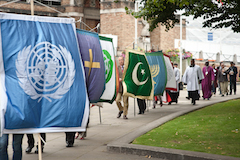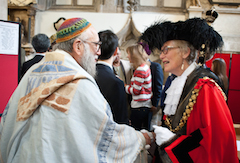| |
|
 |
PRESS RELEASE: ARC calls for real partnership with faiths, not tokenism
September 24, 2015:
 |
 |
 |
Procession of faith partners, Bristol |
As the Pope makes an historic address to the UN General Assembly tomorrow, ARC calls on the United Nations and other development partners to engage in “real partnership, not tokenism” with faith groups.
ARC Secretary General Martin Palmer said for too long the faiths have not only been ignored but often dismissed and patronised – even though more than 80% of the world’s population say they belong to a religion and faith groups are among the world’s biggest providers of education, health and aid.
They needed more than “just walk-on parts in the drama of the Sustainable Development Goal process”, he said: “Let’s be frank. The Pope’s visit to the UN could either be simply seen as a sort of good luck charm that the UN can waive around or it can be the real start of an engagement with civil society’s largest, best organised and most trusted sector – the faiths.”
 |
 |
 |
Lord Mayor of Bristol, Clare Campion-Smith, greets Rabbi Arthur Waskow of the Shalom Center. |
Pope Francis will address the UN tomorrow ahead of a three-day summit involving more than 150 world leaders who will formally adopt 17 Sustainable Development Goals (SDGs) that will set the global development agenda for the next 15 years.
Faith action on the SDGsMartin Palmer said the faiths are already taking action on many of the areas addressed in the SDGs. For example, on September 8-9, 2015, 24 faith groups and faith-based organisations around the world launched far-reaching action plans to help the world’s poorest people.
Known as the Bristol Commitments, they include pledges to develop micro credit schemes for the poor, increase access to education, plant trees, invest in clean energy, green pilgrimage and train people sustainable agriculture. They were launched by traditions from Baha’ism, Buddhism, Christianity, Daoisism, Hinduism, Islam, Judaism, Shintoism and Sikhism.
“The Bristol Commitments show that the faiths will be doing what the UN called SDGs, whether the UN manages to find the funding and support for them or not,” said Martin Palmer.
“The door has been opened a crack. Will the UN, so often constrained by fearful officials and worried national governments, be able to take the bold step of real partnership with the world’s oldest caring organisations? Or will it go back to its usual position of distrust or even worse, patronising of the faiths?
“The relevance of the UN will to some degree be determined by what happens next. It is fine to have general well-meaning statements of religions supporting good things but that is to give the faiths just walk-on parts in the drama of the SDGs.
“The Bristol Commitments are real, substantive offers of programmes which are already being rolled out, as being a serious contribution from civil society towards goals which, for a variety of different reasons, so many faiths share with the UN and the World Bank. That is what partnership looks like from the faith perspective.”
More information
For more information about the Bristol UN faiths meeting, visit our dedicated event page.
To download specific faith commitments, visit here.
For photographs of the Bristol UN Faiths Meeting, visit our Flickr site.
For examples of how the faith pledges support the SDGs, visit our Bristol Commitments page.
Download a full copy of this press release here.
|
 |
 |
|
|
|
|
|
 |
September 9, 2015:
PRESS RELEASE: Ten-year faith commitments launched at UN Faiths Meeting in Bristol
Faith leaders from around the world and United Nations officials gathered in Bristol, UK, this week to discuss how to support the Sustainable Development Goals (SDGs), aimed at ending poverty and creating a more sustainable planet. |
 |
Faith in the Future: UN Bristol Meeting Sept 2015
UNDP and ARC are co-hosting a major meeting on Faiths and the Sustainable Development Goals in Bristol, UK, September 7-10. This is a key part of the UN's post 2015 process. |
 |
Bristol Faith Commitments
Faith groups from 24 traditions from around the world have launched a raft of 10-year pledges to develop micro credit schemes for the poor, increase access to education, plant trees, invest in clean energy and green pilgrimage. |
 |
 |
|
|

